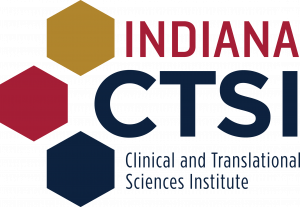Seven postdoctoral researchers at Indiana University, Purdue University and the University of Notre Dame have been awarded grants from the Indiana Clinical and Translational Sciences Institute (CTSI) to support their biomedical research projects.
 The Indiana CTSI is a National Institutes of Health (NIH)-funded collaboration of IU, Purdue, Notre Dame and public and private partnerships that aims to improve the health of people in Indiana and beyond.
The Indiana CTSI is a National Institutes of Health (NIH)-funded collaboration of IU, Purdue, Notre Dame and public and private partnerships that aims to improve the health of people in Indiana and beyond.
Each awardee received a $5,000 grant as part of the Indiana CTSI’s Postdoc Challenge program. Postdoc Challenge grants are awarded for projects that use Indiana CTSI Core Facilities to translate lab research into human patient treatment through the development of clinical trials and studies or research aimed at enhancing the adoption of best practices.
2016-17 Postdoc Challenge grant awardees are:
Shirisha Chittiboyina, Purdue University
Indiana CTSI Core Facility: Agricultural Genomic Center
Project Title: To identify the role of NuMA in triple negative breast cancer invasion and drug resistance
Project Summary: Rapid progression and resistance to existing therapies make triple negative breast cancer (TBNC) a clinically challenging disease. Aggressive cancers with poor prognosis and less response to cytotoxic drugs, show low levels of NuMA, a structural protein and chromatin organizer that binds to DNA of nearly 4,000 genes according to ChiP-Seq analysis. Using ATAC-Sequencing, a novel genomic tool, we aim to identify from this gene pool, potential targets that can reverse aggressiveness and chemoresistance in TNBC.
William Kenkel, IU Bloomington
Indiana CTSI Core Facility: Indiana Center for Biological Microscopy
Project Title: Developmental Consequences of Maternal Oxytocin Exposure at Birth
Project Summary: This project aims to use a new method that turns brains transparent in order to better see fine details deep inside. We will use a state-of-the-art microscope to look at the brains of animals exposed to a hormone commonly given to women in birth.
Alexander Lakhter, IU School of Medicine
Indiana CTSI Core Facility: IU School of Medicine Proteomics Core
Project Title: Identification of β-cell-derived extracellular vesicle surface peptides
Project Summary: Type 1 Diabetes Mellitus (T1D) is a chronic autoimmune disease impacting 1.25 million people in the U.S. This proposal aims to discover biomarker strategies to detect T1D prior to the onset of clinically irreversible insult, which could ultimately lead to the development of preventative and/or curative interventions.
Phillip McCown, University of Notre Dame
Indiana CTSI Core Facility: Genomics and Bioinformatics Core Facility
Project Title: Molecular Basis of RNA Recognition by METTL16, a Human Methyltransferase
Project Summary: Previous experiments have shown that METTL16 binds to the MALAT1 RNA triple helix and to ribosomal RNA. As RNA triple helices are rare structures in humans, identifying the RNA targets of METTL16 may yield previously unknown structured RNAs, while revealing RNAs that may be methylated by METTL16.
Elsa Mevel, IU School of Medicine
Indiana CTSI Core Facility: Purdue Bone and Body Composition Core
Project Title: CaMKK2 as a target for osteoarthritis
Project Summary: Based on our cumulative published and preliminary data that indicate anti-inflammatory as well as anti-bone resorption roles for CaMKK2, we hypothesize that its inhibition would prevent and/or reverse inflammation and subchondral bone alterations caused by OA. We will utilize the services of the Purdue Bone and Body Composition Core to perform mechanistic investigations into the role of CaMKK2 in OA and evaluate its inhibition as an efficacious treatment strategy.
Taylor Raborn, IU Bloomington
Indiana CTSI Core Facility: The Center for Genomics and Bioinformatics
Project Title: Efficient next-generation promoter profiling in human tissues
Project Summary: The signals that regulate gene expression converge at the promoter, which is the site of transcription initiation. Genome-wide identification of promoters using transcription start site profiling (TSS profiling) has provided valuable insights on the regulation of gene expression in multiple model systems, including human, but the technical difficulty of these methods provide a barrier to wider adoption. We present a novel, more efficient TSS profiling method, called CrIP-seq (Capped RNA Immunoprecipitation), and will benchmark CrIP-seq with three well-characterized human cell lines. We envision that the CrIP-seq method will make large-scale promoter identification feasible for a wider array of laboratories, including medical investigators with interests in genomics.
Gozde Uzunalli, Purdue University
Indiana CTSI Core Facilities: Histology Research Laboratory
Project Title: Pathologic Characterization of the Blood-Tumor Barrier in Brain Metastasis of Lung Cancer
Project Summary: Approximately 40 percent of lung cancer patients develop brain metastasis, with an overall survival time of three to six months. The brain is altered following colonization of lung cancer cells, and chemotherapeutic treatment is ineffective. Our goal is to characterize the structural changes in the brain to identify effective targets for treatment.
